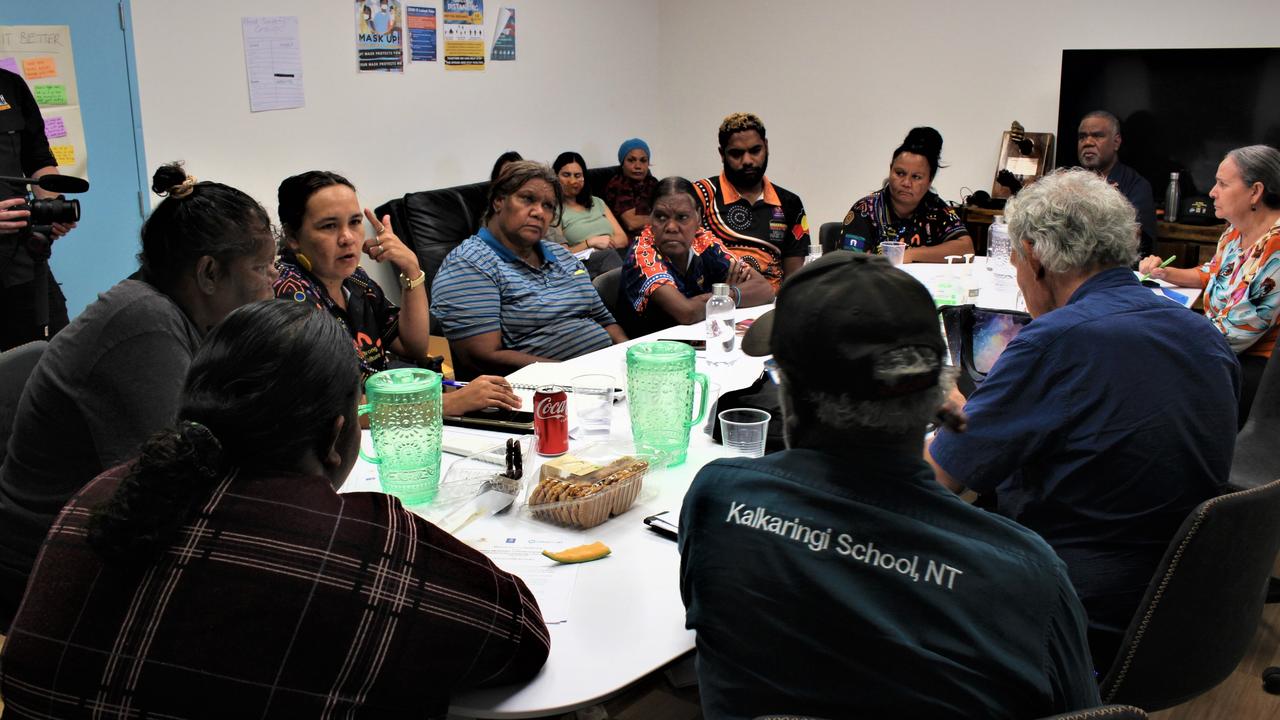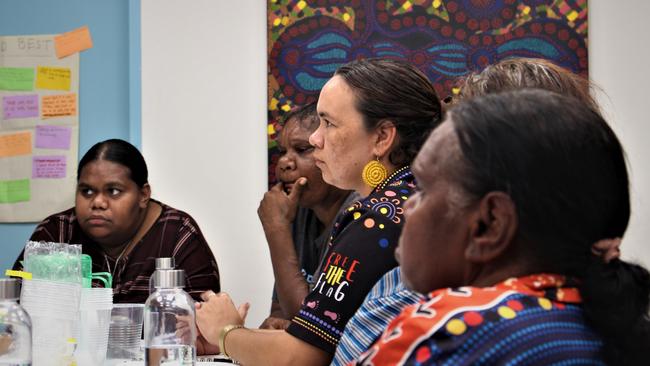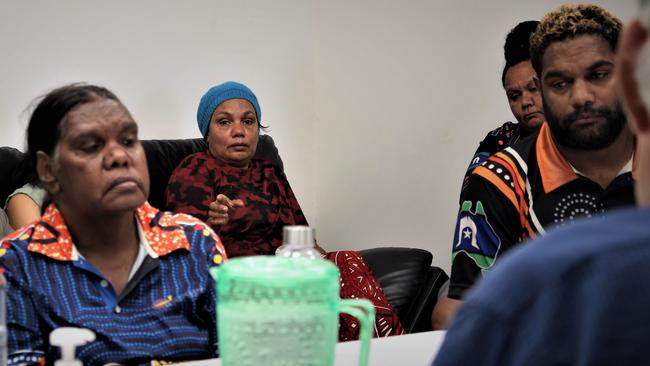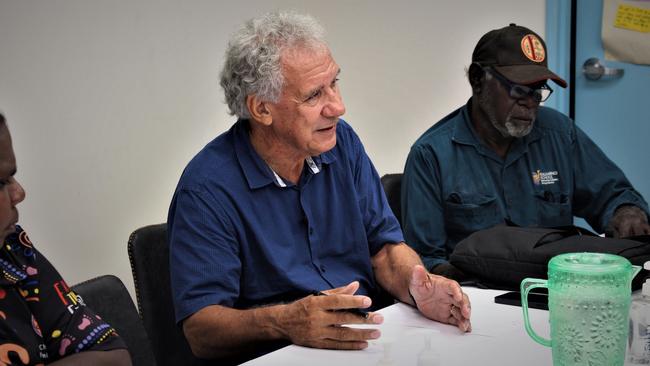IT’S a typically hot May morning in Kalkaringi (Kalkarindji) and taking refuge inside the airconditioned comfort of the new Child and Family Centre, members of the Local Advisory Board are deep in discussion.
The guest speaker is ABC sports caller, Charlie King, and the meeting is something of a homecoming for the anti-domestic violence campaigner, a Gurindji man on his mother’s side.
It’s partly for that reason that King has chosen this place to launch his new community mobilisation initiative, which seeks to empower Aboriginal communities to tackle Australia’s national shame.
Another reason King has chosen to start the new phase of his campaign in Kalkaringi is to tap into the proud history of the Aboriginal land rights movement of the local Gurindji people, descendants of the station workers who led the Wave Hill Walk Off in the 1960s.
The new greatest challenge of our time, as King sees it, is taking head on the domestic and family violence (DFV) crisis ravaging Indigenous and non-Indigenous communities alike in 21st Century Australia.
“It’s worse than war, it’s worse than a pandemic,” he tells the group, citing statistics that show more than two million DFV incidents are recorded throughout Australia each year.
He sees a parallel between the history making activism of the likes of Vincent Lingiari and the struggle against DFV, and wants to see “Gurindji people rising up, yet again, like they did in the ‘60s”.
“It’s about encouraging the community to rise up, you know, like those old men did when they wanted to leave Wave Hill,” he tells the meeting.
“When they were getting treated so badly, what did they do? They rose up, they rose up and they said ‘We’re not going to put up with that’, and that old man led them off Wave Hill Station, and they walked away.
“This is the next really bad thing for us to deal with, and here’s a good chance for the Gurindji people to be the first ones to take on this new way of doing business, of having community mobilisation happening here, right here.”

Speaking after the meeting has wrapped up, King says the difference between community mobilisation and all the well meaning programs that have come before, is its focus on “helping communities feel pride in their tribe”.
If all goes well today, the No More campaign will fund one or more part time positions for community leaders who will oversee and implement programs designed by and for the local community.
Despite his close family ties to Kalkaringi, King says the visit is not about him telling anyone what to do and for the program to work, the ideas have to be driven by, and accountable to, the local community.
“This is more about saying ‘What is it that you think you want to do?’,” he says.
“The last thing you want is to go in there and be telling them what they’re supposed to do because they’re sick of that, that’s been going on for years, you know, people turning up and saying ‘I have an idea, this is what you should do’.
“It moves the community into ownership and it makes them feel more proud of their community every time they get some success out of something.”

Quitaysha Thompson is the manager of the Child and Family Centre (CFC) in Kalkaringi — or Ngaliwany Purrp’ku, meaning “ours to share” — and she says while DFV is not the centre’s core business, “it is a big problem”.
“We know domestic violence goes on in our communities but how to deal with it within ourselves is something that we’re trying to get used to, and the staff to try and get used to as well, because it’s just something that seems to not be spoken about,” she says.
“Here at the Child and Family Centre, that’s something that we’re trying, to get comfortable with talking about the uncomfortable stuff and that takes time.”
But Thompson says she sees the community mobilisation ideas canvassed at this morning’s meeting as a “wonderful opportunity for Gurindji” to be the first to “start working in this different way to see a shift in our communities”.
“I’m all for everything to be locally driven, creating a model that’s going to work, through heavy community consultation,” she says.
“The importance of community consultation and creating our model, creating our own program, to me that works.
“Far too often we see a lot of programs, a lot of government projects, come to community with their own models, that doesn’t work — this will really work if it’s left in the community’s hands.”
The first suggestion Thompson wants to see taken up by whoever the community appoints to oversee the program is to facilitate “more support for our men”.
“Giving our men a space where they can sit down, yarn, have healthy conversations, a place for our men where they can feel safe as well, and that’s something that we really want to put our focus towards,” she says.
“And now with this family violence program I feel like we’re moving in the right direction to seeing that happen.”

For CFC committee member, Leah Leaman, who also works at the local women’s shelter, the bottom up approach is critical to tackling a problem that for too long has involved outsiders who “flew in and flew out”, achieving nothing.
“But,” she says, “if we empower our own people from within our community we have a chance”.
“We call them like blowflies, you know, they fly in with their expensive planes, white Toyotas, and they’re gone again, the blow ins, and we say ‘Well what have they done?’,” she says.
“Where’s all that money gone, on the flights, on the accommodation, all that, but where’s the actual ground work that they came and said they would do?
“Then people are still left standing, scratching their heads and saying ‘Well what was the purpose of that? That was a complete waste of taxpayers’ funds’ — whereas if the people drive it, you know, get the help, yes, but to lead it, you need the people.
“In this community, we have our fair share like everywhere else, every community has domestic violence and the reality is, we can only fix the problem as a people, the government can’t fix it for us.”
Leaman also agrees that the first focus of the community mobilisation initiative should be on the men.
“The problem too is we need more men to step forward, step up, for a long time it’s the women, but we have to help one another, the women and the men have to help one another,” she says.
“For instance, here, we don’t have a men’s place where they can come together and sit down and talk about these things.
“We’ve got a safe house where the women can come but there’s no place for men to come together to sit down, or if we want to get someone in, from town, like counsellors, there’s no space for them.”

Local mum of three, Kira Dandy, says hearing the shocking statistics about how many, mostly women and children, become victims of DFV in Australia each year is “frightening and scary”.
“It scares me that the numbers are growing, and as a mother of three little girls, I don’t want them finding men that would beat them up because that’s normal around here, you know?” she says.
“Like little boys seeing their dad doing that and then they attempt to do that because they’ve seen it.”
With her daughters’ future at stake, Dandy could not be more motivated to do her bit to make sure the new way of working is a success in Kalkaringi.
“It’ll make our community stronger and I think it’s a really good idea, because having someone on the ground, someone from here, delivering it, then people can relate to it because it’s someone they know,” she says.
Charlie King says there are two main criteria for deciding whether community mobilisation will work in any given place — “a willingness to make a difference and a readiness to do it” — and he’s found both in Kalkaringi.
“We knew there’d be a certain pride in the tribe, their name is well known around Australia,” he said.
“Because that’s where land rights started (we expected) they’d be proud to be, again, forerunners on making a change.”
The next step is to now use the meeting in Kalkaringi as a springboard to launch the initiative in other remote communities and, using relationships with police and corrections, to analyse the statistics and find out what is, and isn’t, working in each of them.
“Choosing the community is not necessarily the ones with high levels of family violence,” he says.

“The decisions about who we work with is a willingness and readiness to do something, but then we look at things like what are the basic statistics from the community.
“One measurement could be about recidivism, men who go to jail for violence and then come out and go back into jail again, so that’s going to be an area we’ll look very closely at.
“Instead of filling up the prisons — which is going to cost $5b to build a new prison — spend some of that money stopping people going to prison.”
Proud Gurindji/Malngin woman, Leah Leaman, says for too many people, DFV is still considered “none of my business”, when “actually, it’s everybody’s business”.
“We all have children and we have to think, not as black and white so much, but as a human being — ‘What do we want in this world for the future of our kids?’ — and it has to start somewhere,” she says.
“Like the old man said, Vincent Lingiari, you know, ‘From little things, big things grow’.”

Add your comment to this story
To join the conversation, please log in. Don't have an account? Register
Join the conversation, you are commenting as Logout
Witnesses to Alice Springs death in custody demand independent investigation
More than 700 Territorians have signed a call for an independent investigation into the death in custody of Kumanjayi White.
Hefty spike in CDU TAFE enrolments
Enrolment numbers are on the rise for Charles Darwin University TAFE with enrolment numbers already surpassing last year’s total to date by almost 14 per cent.